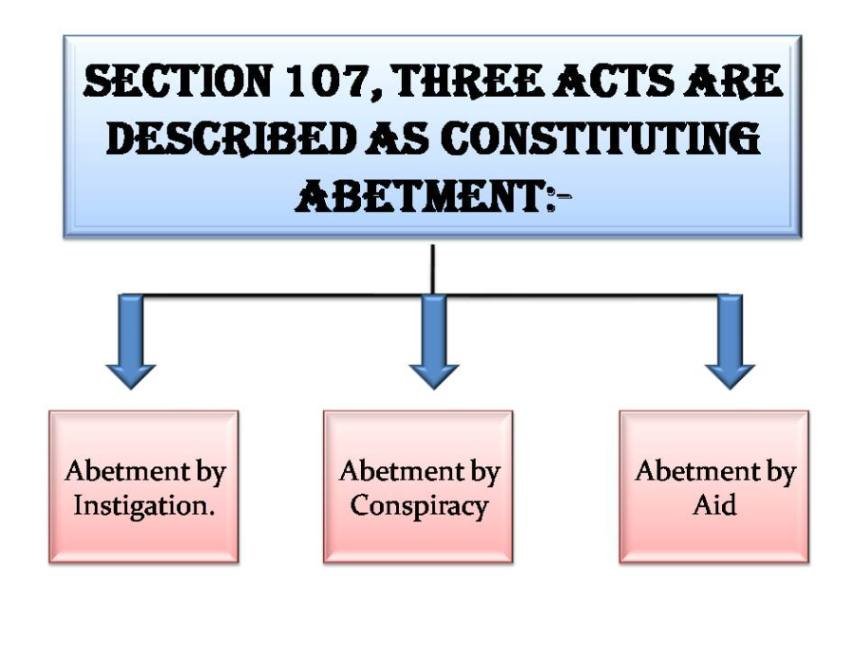Abetment meaning under Section 107 of IPC 1860
Introduction:- The word ‘abet’ means ‘help, cooperation, and support,’ and it also refers to an illegitimate reason for committing a crime.
It must be demonstrated that the person who has encouraged something has been associated not only with the means of transactions but also with the criminal means of transactions if someone is to be convicted for encouraging them to do something under any of the conditions set out in Article 107 of the Indian Penal Code.
Chapter V (sec.107 to 120) of the I.P.C is expounded to the offence of abetment (the act of helping another person to commit a crime). Abetment meaning under section 107 of the Indian Penal Code says that when an individual is alleged to assist the doing of a thing/issue.
meaning of abetment
Under Section 107, the meaning of abetment is:
- Instigates;
- associated or engaged in a conspiracy (a secret plan to do something bad) with one or more different people;
- Deliberately aids in the commission of that act through any conduct or criminal omission.
For example, if X, a public officer, is authorised to detain Z by a court of justice warrant, B, knowing that fact or reality and collectively that C isn’t Z, wilfully misrepresents C to X and causes X to apprehend C. B aids C’s apprehension by instigating/provoking it.
types of abetment
In Section 107, three acts are described as constituting abetment:-

- Abetment by Instigation.
- Abetment by Conspiracy.
- Abetment by Aid
Abetment By Instigation
To instigate is to provoke or encourage someone to do something and an individual is accused of instigating another when he actually suggests, stimulates, or encourages him to do something, whether directly or indirectly.
Abetment by Conspiracy
A conspiracy is identified as a joint agreement between two or more individuals
- To commit an unlawful act or
- To commit an illegal act by using illegal ways.
- For conspiracy associate abetment/instigation, an undisguised act or illegal omission in furtherance of the conspiracy should be carried out as agreed between them.
Abetment by Aid
The third type of abetment is by purposefully assisting.
The key ingredients of the abetment by aid offence are as follows:
- The act or omission that constitutes the assistance must have been intentionally done.
- The assistance was provided through a positive act or an illegal omission.
- The aid must be given either before or during the commission of the crime abetted
- The assistance must have been given with the intent of aiding the commission of the offence,
- The assistance/aid should indeed have been expedited.
- and it must have been expedited. As a result, there is no abetment if the act or omission constituting the aid was done accidentally or by mistake.
At last, it must be noted that mens rea is an essential component of the abetment offence. There is no such thing as abetment without mens rea.
Punishments under section 116
The punishments for such abetments are covered by Section 116 of the Indian Penal Code.
Sec116: If the offence has been abetted, not committed and it has been punished with imprisonment and the penalties for such offence have not been set out in any categorical way, the offender shall also be punishable with imprisonment of up to one-fourth or a penalty incurred or punishable by both.
If the person abetted is a public official with an obligation to protect the commission of any crime and is aided to commit an offence, the abettor is also punished for up to one-half of the maximum punishment for that offence or the maximum fine for that offence, or with each.
Conclusion
Abetment is a substantive offence which, regardless of whether or not the act is committed, can be punished. When the person who performs the act is held accountable under the Indian Penal Code of 1860, but also the one who instigated the act is held liable for instigation or assistance because that person instigated the act.
While the person who initiated the act is held liable. As an outcome, we think that making abetment a crime is equitable inclusive law that strengthens the natural justice principle in the legal system. As previously stated, there are four different stages of crime, and abetment may occur at the preliminary level of preparation and is punishable by imprisonment, fine, or both, as specified in the provision.

























